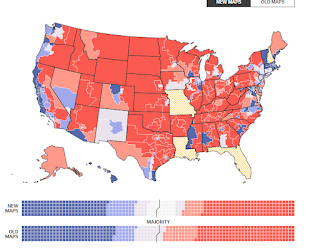Redistricting is Going on in Four Final States: And it Could Determine Control of Congress
Democrats have a reason for hope in the 2022 midterms. During the 1994 midterms, Democrats under Bill Clinton lost control of both houses of Congress for the first time in 40 years and only the second time in 60 years. During the 2010 midterms, Democrats under Barack Obama lost the House of Representatives. Keeping control of both houses of Congress during the 2022 midterms under President Biden would be major progress for the party and needs to be a priority, especially when considering how Republicans have fared in their midterms. Ronald Reagan and George H.W. Bush never had full control of Congress, George W. Bush gained the Senate during the 2002 midterms, and Donald Trump lost control of the House in the 2018 midterms. Republicans have been doing more poorly in midterms when they have the White House as time goes on, and Democrats doing better would complement this progress.
Democrats went into redistricting with a gloomy outlook, as Republicans held more redistricting power than they. This, however, proved to be unfounded. After the 2010 midterms, states like Wisconsin and Michigan saw themselves gerrymandered to a heavy GOP advantage. After the 2020 census, however, things went much differently. During 2010-2012 redistricting, Democrats had a narrower legislative majority and a GOP governor in California; a split legislature in New York and Colorado; Republican government trifectas in Louisiana, Wisconsin, and Michigan; Republican governors in Virginia, Nevada, and New Mexico; a moderate Democrat and fully Republican legislature in Minnesota, etc. As a result of changes over the past decade, Democrats have been able to pursue aggressive pro-Democratic majorities in New York, California, Colorado, New Mexico, Nevada, Virginia, and other states while undoing or halting GOP gerrymanders in states like Louisiana, North Carolina, Ohio, Wisconsin, and Michigan.
Only four states have yet to complete the redistricting process: Missouri, Louisiana, Florida, and New Hampshire, a combined total of 44 House seats. There has been no breakthrough on maps in Missouri, which are due by March 29th and will likely have to be drawn by the Missouri Supreme Court. There is a five-to-four conservative majority on the court, so the best hope for Democrats will be to hope one of the justices does the right thing. In New Hampshire, maps are due June 1st, and they are due June 13th in Florida, a state that will likely also see an intense legal challenge, and July 22nd in Louisiana. While Florida's map has the most seats to lose, the most intense fight is being set up in Louisiana, which will be the last state to complete redistricting as well as the only one of the four with a Democratic governor; just last week, John Bel Edwards vetoed maps proposed by the GOP.
Redistricting has already gone very well for Democrats. There are 181 Democratic-leaning seats, 11 more than there were from 2010 to 2020. If even 11 out of the 44 remaining seats lean Democratic, that will be an improvement of 22 seats, or one-eighth, over the prior decade. These will not all translate into actual seats won, but, in the view of most scholars, will serve as a five-to-ten seat buffer in the 2022 midterms.
As for the midterms themselves, it will come down to what we accomplish, as even an advantage over the GOP would still leave control of the House to the few dozen highly competitive seats. Inflation should ease by the end of the year, especially if the Senate confirms President Biden's nominees to the Federal Reserve as soon as possible; no matter what happens, the war in Ukraine will never be a victory for Putin and has instead provided a landmark opportunity to strengthen Western alliances; the Unity Agenda, most of which was either contained in the 2022 budget or will be contained in the 2023 NDAA and/or budget and otherwise includes only a few landmark bills, is on track to pass. This leaves two main objectives: the Build Back Better Act, which Congress continues to negotiate behind closed doors, and student debt. If the aforementioned objectives are achieved, the chance for Democrats becomes astronomically better.

Comments
Post a Comment